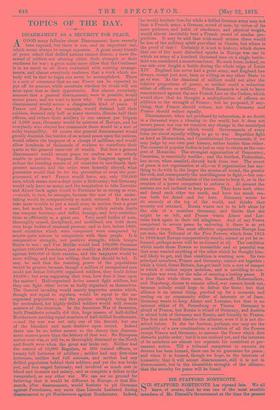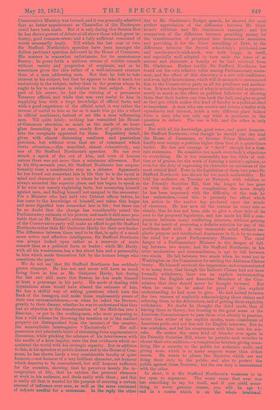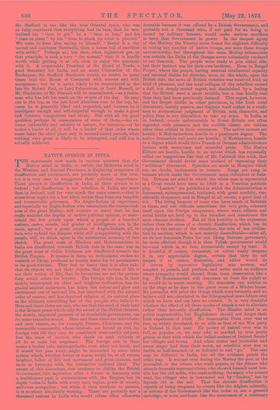SIR STAFFORD NORTHCOTE.
SIR STAFFORD NORTHCOTE has ripened late. We all knew, of course, that he was one of the most sensible Members of Mr. Disraeli's Government at the time the present
Conservative Ministry was formed, and it was generally admitted that no better appointment as Chancellor of the Exchequer could have been made. But it is only during this Session that he has shown powers of debate at all above those which great in- dustry, good common-sense, and a fully sufficient command of words necessarily imply. Till within the last year or two, Sir Stafford Northcote's speeches have been amongst the dullest pertinent speeches delivered in the House of Commons. His manner is somewhat unfortunate, for its monotonous fluency ; he pours forth a uniform stream of voluble remark without variety and proportion of emphasis, and so he sometimes gives the idea rather of a well-informed creature than of a man addressing men. Not that he fails to take interest in his subject, but that he appears to take it much too exclusively in the subject, rather than in the persons whom he ought to try to convince in relation to that subject. For a part of his career, he had the training of a permanent Treasury official, and while that was very useful to him in supplying him with a large knowledge of official facts, and with a good experience of the official mind, it was rather the reverse of useful to him so far as it made him go like a wheel in official machinery, instead of act like a man influencing men. Till quite lately, nothing has resembled his House- of-Commons elocution so much as the sands of an hour- glass descending in an easy, steady flow of gritty particles into the receptacle appointed for them. Expository detail, given with almost distressing readiness and passionless precision, but without even that air of command which rivets attention,—this described, almost exhaustively, any one of Sir Stafford Northcote's speeches. No one ever struck a spark of fire out of him, and even of human nature there was not more than a minimum allowance. But in his fifty-seventh year, Sir Stafford Northcote has unques- tionably risen a considerable step as a debater. Apparently he has found out somewhat late in life that he is the equal in mind and character of many to whom he had in his modesty always accorded the superior place, and has begun to speak as if he were not merely explaining facts, but measuring himself against men, and finding himself not unequal to the encounter. For a Minister who had held two Cabinet offices before, he has come to the knowledge of himself, and taken this larger and more dignified tone somewhat late in life ; but there can be no doubt that the change has considerably raised the Parliamentary estimate of his powers, and made it still more pro- bable that on Mr. Disraeli's retirement a very influential section of the Conservative party will make an effort to get Sir Stafford Northcote rather than Mr. Gathorne Hardy for their new leader. The difference between them used to be that, in spite of a much more active and effective intelligence, Sir Stafford Northcote was always looked upon rather as a reservoir of acute remark than as a political force or leader ; while Mr. Hardy, with all his woodenness, has a fire about him and a personality in him which made themselves felt by the human beings who constitute the party.
We do not say that Sir Stafford Northcote has suddenly grown eloquent. He has not and never will have as much living force in him as Mr. Gathorne Hardy, but during the last and still more this Session he has made himself at least a personage in his party. His mode of dealing with deputations alone would have altered the estimate of him. He has a skilful way of asking questions which turn the flank of the besiegers, and make them unpleasantly aware of their own unreasonableness,—as when he asked the Brewers, greatly to their dismay, whether he was to understand that they had no objection to the transformation of the Malt-tax into a Beer-tax ; or put to the working-men, who were proposing to him a wild scheme for throwing the taxation on to the realised property (as distinguished from the income) of the country, the monosyllabic interrogative " Exclusively ?" His self- possession and admirable habit of abstaining from argumentative discussion, while pricking the schemes of his interviewers with the needle of a keen inquiry, were the first evidences which ac- quainted the world with his strategic capacity. But in addition to this, in his speeches at public dinners and in the House of Com- mons, he has shown lately a very considerable faculty of quiet humour,—not humour of a very brilliant character, not humour which deserves to be remembered, but still humour sufficient for the occasion, showing that he perceives keenly the in- congruities of life, that he catches the personal elements at work in his audience, and deals easily with them ; and this is really all that is wanted for the purpose of securing a certain amount of influence over men, as well as the mere command of subjects needful for a statesman. In the reply the other
i day to Mr. Gladstone's Budget speech, he showed the most 1 perfect appreciation of the difference between Mr. Glad- stone's criticism and Mr. Gladstone's example ; and his
comparison of the difference between providing money for the transformation of perpetual into terminable annuities, and providing it for the direct cancelling of Debt, to the difference between the Scotch school-boy's pitch-and-toss and neevie-neevie-pick-nack, was both happy in itself, and especially well adapted to turn aside the force of so serious and elaborate a homily as he had received from Mr. Gladstone. Rather tardily Sir Stafford Northcote has found out his own relative value among Parliamentary states- men, and the effect of this discovery is a new self-confidence, and even light-heartedness, which will do as much to recommend him to the Conservative party as all his prudence and modera- tion. It is not the importance of what is actually said in repartee, nearly so much as the effect on political followers of showing them that their leaders can toss back the ball, and give as good as they get, which makes this kind of faculty in a political chief so important. A man who can receive and return a buffet with equanimity and interest, holds a very different place indeed from a man who can only say what is pertinent to the question in debate. The one is felt, and the other is only heard.
But with all his knowledge, good sense, and quiet humour, Sir Stafford Northcote, even though he should one day lead the House of Commons, or become Prime Minister, will hardly ever occupy a position higher than that of a quiet-times leader. He has not courage or " devil" enough for a first- rate statesman. He considers too much everybody's objections to everything. He is too reasonable, has too little of voli- tion or of genius, for the work of forming a nation's opinion, or even for the duty of expressing its character on occasions of the most critical kind. Even in the legislation of these two years Sir Stafford Northcote has shown far too much malleability. He told his audience on Tuesday at Newport, with relation to the Friendly Societies Bill, that the longer he has gone on with the study of its complexities, the more deeply he has been impressed with the difficulty of the task he has undertaken,—and this is precisely the effect which his action in the matter has produced upon the minds of observers. He has seen all the reasons on every side so clearly, that he has not been able to give a clear drift of its own to the proposed legislation, and has made his Bill a com- promise between many conflicting interests, without gaining for it the merit of proposing a definite solution for any of the problems dealt with. A very reasonable mind, without em- phatic purpose and intellectual dominance in it, is by no means the mind for a great Parliamentary Minister. The chief danger of a Parliamentary Minister is the danger of fall- ing between two stools; and Sir Stafford Northcote, in his utter moderation and reasonableness, is apt to fall between two stools. He fell between two stools when he went out to Washington on the Commission for settling the Alabama-Claims treaty. He himself received the impression, and communicated it to many here, that though the Indirect Claims had not been formally withdrawn, there was an explicit understanding between the English and American Members of the Com- mission that they should never be brought forward. But when he came to be asked for proof of this explicit understanding, he had none to give. He had halted between the two courses of explicitly acknowledging those claims and referring them to the Arbitrators, and of getting them explicitly withdrawn. No doubt he thought the third mode, that of leaving them in theory, but trusting to the good sense of the American Commissioners to pass them over silently in practice, better than either of the explicit modes, more considerate of
American pride, and not less safe for English interests. But he was mistaken, and led his countrymen with him into his mis- take. He makes the same kind of blunder over again in his Friendly Societies Bill, where he permits such societies to choose their own auditors,—a compromise between giving some- thing like a security to the public for authentic audit, and giving none, which is in many respects worse than either course. He wants to please the Societies which are not doing their duty by the public, and also to protect the public against those Societies ; but the one duty is inconsistent with the other.
In short, it is Sir Stafford Northcote's weakness to be too open to argument. The worst cause that ever was
has something to say for itself, and if you yield some- thing to every genuine reason, you will be apt t3 end in a course which is on the whole irrational.
Sir Stafford is too like the wise Oriental cynic, who was so fully convinced that everything had its turn, that he neu- tralised his " time to get " by a " time to lose," and his "time to plant" by his "time to pluck up what is planted." We seem to hear him saying to himself, " Better is a dry morsel and quietness therewith, than a house full of sacrifices with strife." Perhaps so ; but then, what legislators get, on that principle, is such a very " dry morsel," that it is hardly worth while getting it at all, even to enjoy the quietness with it. A respectable President of the Board of Trade, a good Secretary for India, and an acute Chancellor of the Exchequer, Sir Stafford Northcote would, no doubt, in quiet times lead the House of Commons with success and with acceptance ; but he is never likely to be remembered as the late Sir Robert Peel, or Lord Palmerston, or Lord Russell, or Mr. Gladstone, or Mr. Disraeli will be remembered,—as a states- man who has left his mark on the events of the day. He may rise to the top, as the late Lord Aberdeen rose to the top, be- cause he is generally liked and respected, and because he is intelligent enough and self-forgetful enough to make a good link between competitors and rivals. But with all his good qualities, perhaps in consequence of some of them,—his ex- treme rationality and sobriety of nature, for instance,—if he makes a leader at all, it will be a leader of that order whose name takes the chief place only in neutral-tinted periods, when nothing very great is likely to be attempted, and still less is actually achieved.




































 Previous page
Previous page